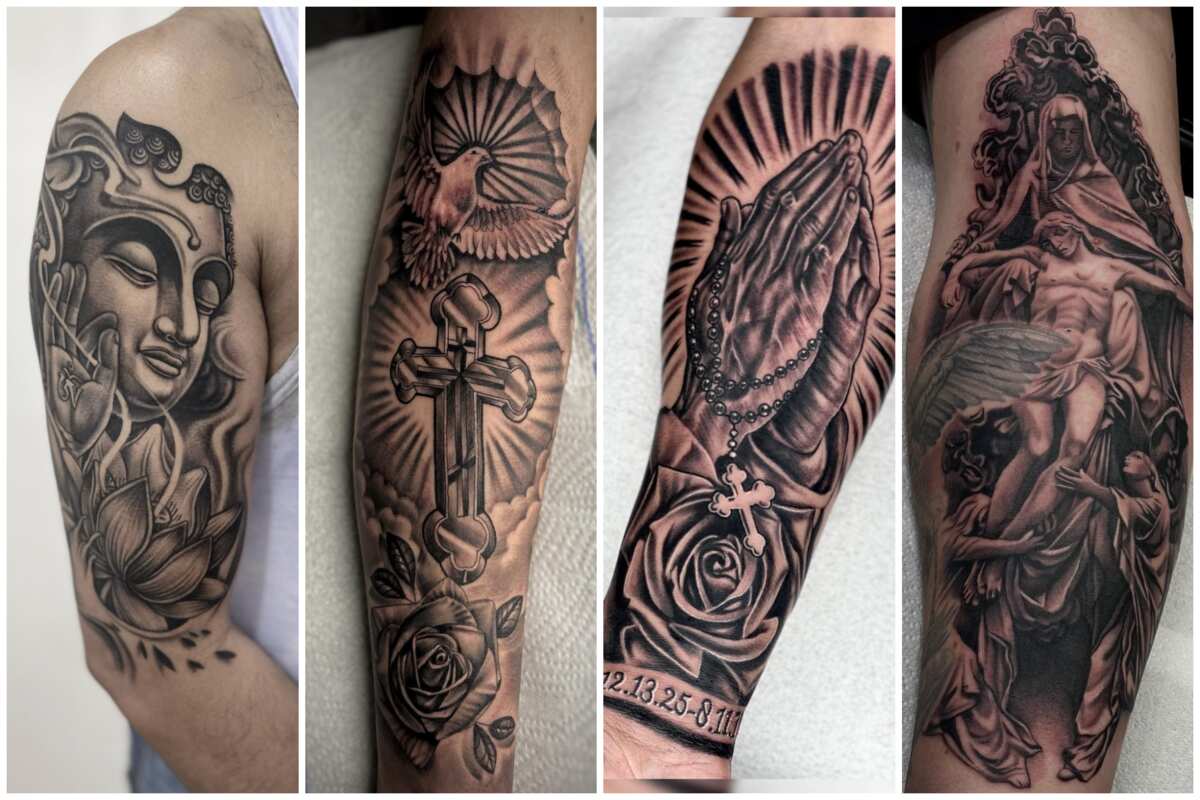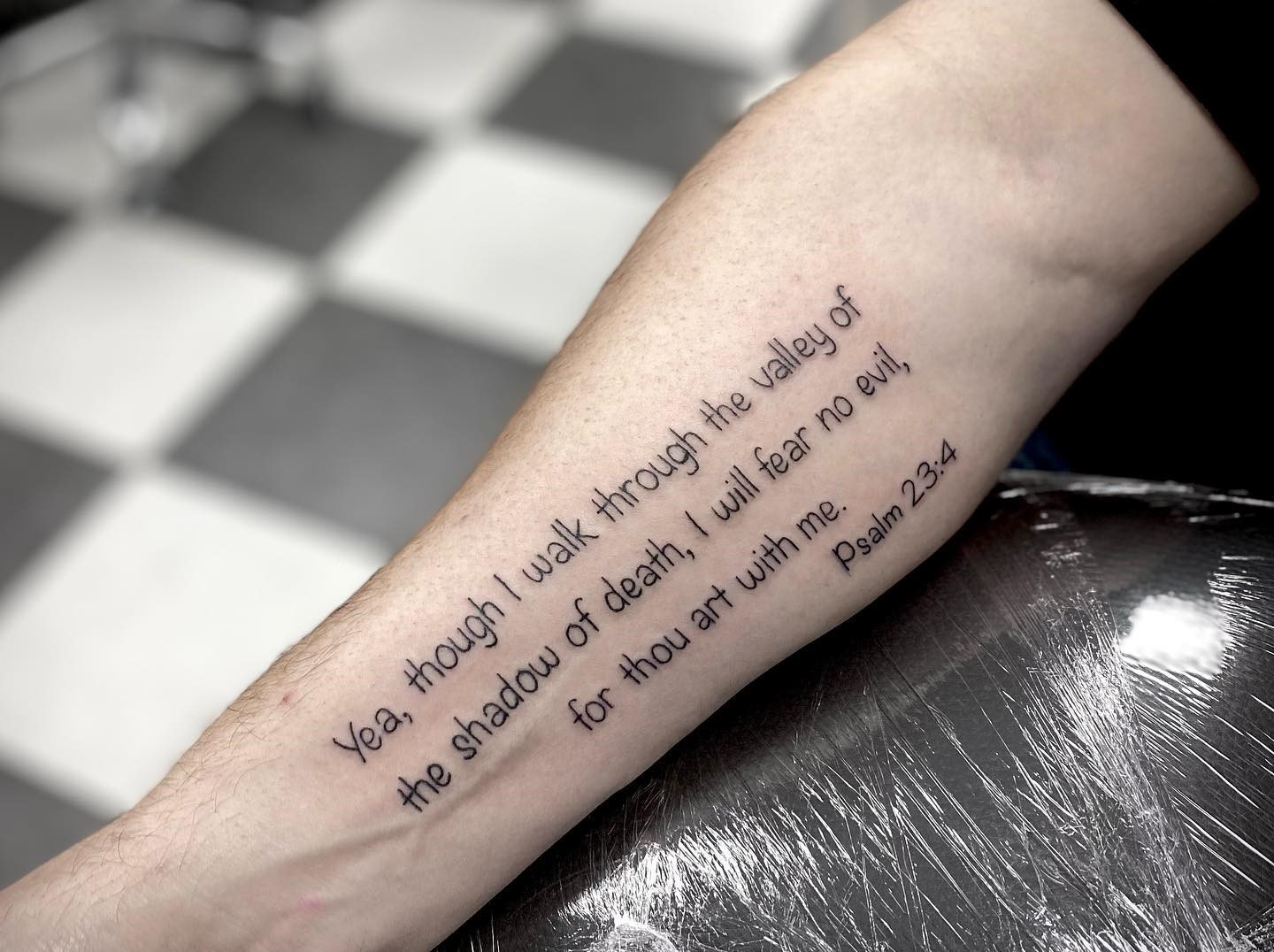Religious scripture tattoos have become a popular way for individuals to express their faith and spirituality through permanent art on their bodies. These tattoos not only serve as a reminder of one's beliefs but also as a powerful statement of devotion. Many people choose to ink sacred texts from holy books as a way to connect deeply with their religion and keep its teachings close to their hearts.
In today's world, where self-expression is highly valued, religious scripture tattoos offer a unique way to showcase one's faith. They are more than just body art; they are symbols of personal conviction and commitment. Whether it's a verse from the Bible, Quran, Torah, or any other sacred text, these tattoos allow individuals to carry their beliefs with them wherever they go.
This article will explore the significance, design ideas, cultural considerations, and practical tips for getting a religious scripture tattoo. Whether you're considering getting one or simply curious about this form of body art, this guide will provide valuable insights into the world of religious scripture tattoos.
Read also:Footloose Film Cast A Comprehensive Look At The Stars Behind The Classic Movie
Table of Contents
- The History of Religious Tattoos
- Popular Religious Scriptures for Tattoos
- Design Ideas for Religious Scripture Tattoos
- Understanding the Meaning Behind Religious Tattoos
- Cultural Considerations in Religious Tattoos
- Practical Tips for Getting a Religious Tattoo
- Aftercare for Religious Scripture Tattoos
- Choosing the Right Tattoo Artist
- Building a Community Around Religious Tattoos
- Frequently Asked Questions About Religious Scripture Tattoos
The History of Religious Tattoos
Religious tattoos have a rich history that dates back thousands of years. In ancient Egypt, tattoos were used as symbols of protection and healing, often featuring religious motifs. Similarly, in Polynesia, tattoos were considered sacred and served as a rite of passage or a symbol of status within the community. Over time, religious tattoos evolved to include scriptural verses, symbols, and imagery that represented various faiths.
Early Christian Tattoos
Christianity has a long tradition of using tattoos as a form of devotion. Early Christians in Egypt and the Middle East would tattoo themselves with crosses, symbols, and scripture to signify their faith. These tattoos often served as a form of protection during times of persecution.
Tattoos in Other Religions
Other religions also have a history of incorporating tattoos into their practices. For example, in Hinduism, devotees may tattoo themselves with images of deities or sacred mantras. In Buddhism, tattoos often feature symbols like the lotus flower or the Dharma wheel, representing spiritual growth and enlightenment.
Popular Religious Scriptures for Tattoos
When choosing a religious scripture for a tattoo, it's essential to select a verse or passage that holds personal significance. Popular choices include:
- Christian Bible verses such as John 3:16 or Psalm 23
- Quranic verses like Surah Al-Ikhlas (Chapter 112)
- Torah passages from Exodus or Deuteronomy
- Hindu scriptures like the Bhagavad Gita
- Buddhist teachings from the Dhammapada
Each scripture carries its own meaning and context, so it's important to research and understand the significance of the chosen text.
Design Ideas for Religious Scripture Tattoos
Designing a religious scripture tattoo involves considering both the text and the artistic elements that will accompany it. Here are some ideas to inspire your design:
Read also:How To Get Your California Contractors License The Ultimate Guide
Calligraphy Styles
Using beautiful calligraphy can enhance the elegance of a scripture tattoo. Different fonts and styles can convey various moods, from formal and traditional to modern and artistic.
Incorporating Symbols
Adding religious symbols to your tattoo can add depth and meaning. For example, a cross, star of David, or crescent moon can complement the scripture and create a more visually appealing design.
Placement Considerations
Where you place your tattoo on your body can also affect its impact. Common areas for religious scripture tattoos include the forearm, upper arm, back, and ribs. Each location offers unique opportunities for design and visibility.
Understanding the Meaning Behind Religious Tattoos
Religious scripture tattoos are deeply personal and carry significant meaning for those who wear them. They serve as constant reminders of faith, hope, and devotion. For some, these tattoos represent a milestone in their spiritual journey, while for others, they symbolize protection and guidance.
Personal Significance
It's crucial to choose a scripture that resonates with your personal beliefs and experiences. Reflect on why this particular verse or passage is meaningful to you and how it aligns with your faith.
Impact on Daily Life
Having a religious tattoo can influence your daily life by reinforcing your values and reminding you of your spiritual commitments. It can also serve as a conversation starter, allowing you to share your faith with others.
Cultural Considerations in Religious Tattoos
When getting a religious scripture tattoo, it's important to be mindful of cultural sensitivities. Different cultures and religions have varying attitudes toward tattoos, so it's essential to respect these perspectives.
Respect for Sacred Texts
Sacred texts are revered in many faiths, and it's crucial to approach them with reverence and respect. Ensure that the translation and interpretation of the scripture are accurate and culturally appropriate.
Community Perceptions
Be aware of how your tattoo may be perceived within your religious community. While tattoos are increasingly accepted, some groups may still view them as unconventional or inappropriate.
Practical Tips for Getting a Religious Tattoo
Getting a religious scripture tattoo requires careful planning and consideration. Here are some practical tips to help you make the right choices:
- Research different tattoo artists who specialize in religious designs
- Choose a reputable studio with proper hygiene practices
- Discuss your design ideas thoroughly with your artist
- Consider the size and placement of the tattoo
- Prepare for the healing process and follow aftercare instructions
Aftercare for Religious Scripture Tattoos
Proper aftercare is essential to ensure your tattoo heals well and retains its vibrant colors. Follow these guidelines to care for your new religious scripture tattoo:
Cleaning and Moisturizing
Keep your tattoo clean by washing it gently with mild soap and water. Apply a thin layer of moisturizer or tattoo-specific cream to prevent dryness and promote healing.
Avoiding Sun Exposure
Protect your tattoo from direct sunlight, especially during the initial healing phase. Use sunscreen with a high SPF to prevent fading over time.
Choosing the Right Tattoo Artist
Selecting the right tattoo artist is crucial for achieving the desired result. Look for artists who have experience with religious designs and can provide references or portfolios showcasing their work. Schedule a consultation to discuss your ideas and ensure you're comfortable with their style and approach.
Building a Community Around Religious Tattoos
Many individuals who get religious scripture tattoos find joy in connecting with others who share their faith. Joining online communities or attending events focused on religious art can help you build meaningful relationships and share experiences with like-minded people.
Frequently Asked Questions About Religious Scripture Tattoos
Here are some common questions people have about religious scripture tattoos:
Can I get a tattoo of a sacred text?
Yes, as long as you approach it with respect and understanding of the text's significance. Ensure the translation and design are accurate and culturally appropriate.
Will my religious community accept my tattoo?
Acceptance varies depending on the community and individual beliefs. It's important to consider how your tattoo may be perceived and whether it aligns with your personal values.
How long does it take to heal?
Healing times vary, but most tattoos require 2-4 weeks of proper care. Follow your artist's aftercare instructions to ensure a smooth recovery.
Conclusion
Religious scripture tattoos offer a meaningful way to express faith and spirituality through art. By carefully selecting a verse, designing a thoughtful tattoo, and respecting cultural sensitivities, you can create a lasting reminder of your beliefs. Remember to choose a reputable artist, follow proper aftercare, and consider the impact your tattoo may have on your community.
We invite you to share your thoughts and experiences in the comments below. Whether you're planning to get a religious tattoo or simply appreciate the art form, your input is valuable. Feel free to explore other articles on our site for more insights into faith, art, and self-expression.

